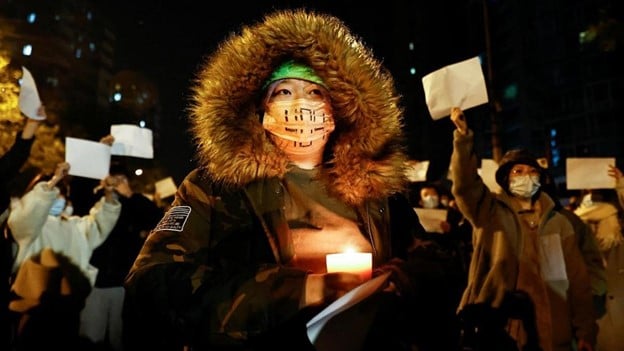In the early days of the Covid pandemic, pro-Kremlin commentators praised China's successful Zero-Covid policy as proof of the superiority of authoritarian regimes in protecting their citizens. China's recent difficulties with this policy as exemplified by the harsh lockdowns and the mass protests that they have sparked, has not produced a reassessment of the original viewpoint. The earlier triumphalism had vanished, once Russia itself experienced difficulties in coping with the pandemic.
Now everything is subordinated to the war in Ukraine, and the recent events in China Kommersant foreign affairs commentator Maxim Yusin do not bode well for Russia. Tensions between the United States and Russia have been closely followed in Russia. The hope being that a further escalation of these tensions and particularly surrounding Taiwan would both solidify the Sino-Russian alliance or at the least compel the US to cut back on its support for Ukraine. Yusin believes that the Chinese regime's domestic difficulties as evidenced by the massive anti-regime demonstrations will compel Beijing to dial down tensions with the US to concentrate on problems at home. It may seek to placate the US by reducing support for Russia. Now that the Kuomintang Party that like Beijing supports a One-China policy has won a convincing victory in the local elections, there is no need for China to force the Taiwan issue.
Yusin's commentary follows below:[1]

SUPPORT OUR WORK

In the past few days, unusual news has been coming from China. Such massive protests have not occurred in the country since the bloody events on Tiananmen Square in 1989. Their appearance was triggered the coronavirus restrictions, which were extremely harshly introduced in China. A zero-tolerance policy implies that a single case can put entire cities under quarantine, including those with a population of several million people. Dissatisfaction with this approach has already spilled over into spontaneous protests, but this time several new points can be distinguished.
First, geographic scope. Demonstrations are going on simultaneously in dozens of places, including in key cities. Secondly (and this is something truly unprecedented), political slogans resound during them, amongst which is the demand for Chinese President Xi Jinping's resignation. This is the very same person who was just recently triumphantly re-elected General Secretary of the Central Committee of the Communist Party for a new five-year term. Both in the party and in the state, his positions seemed invulnerable. And suddenly this.
It is striking that the actions seem to be coordinated. The same slogans are heard in different places, similar technologies are used to spiral the protest. But at the same time, even lovers of conspiracy theories in this case are unlikely to argue that those who are traditionally accused of fueling color revolutions around the world are behind the organization of rallies in China: Western intelligence services, foundations, the collective Soros, and so on.
A far more likely interpretation is that the political opponents of Comrade Xi, who were defeated at the party congress, but did not lay down their arms and did not renounce their ambitions, may be behind the attempts to destabilize the situation in the country.
Be that as it may, the internal political crisis that Beijing is on the verge of, may well affect China's behavior in the international arena.
For some time, the country's leadership may have other priorities that could sideline the geopolitical confrontation with the United States. Moreover, the recent local elections in Taiwan brought a landslide victory for the Beijing-backed Kuomintang party and dealt a blow to the current government of the island, which the PRC considers hostile, separatist and pro-American.
Thus, the acuteness of the Taiwan issue (one of the main irritants in relations with the United States) is removed - there is no point in forcing events for Beijing now. Thus, in relations with the main geopolitical adversary - Washington - a lull may come for some time. Beijing will tackle domestic political problems (the economy, the pandemic, protests) and, possibly, will reduce foreign policy activity.
Unfortunately for Moscow, there is a possibility that this will also affect the Russian direction. The Chinese authorities may consider that too active support of the Russian Federation, mired in Ukraine and in conflict with the West, will become an unnecessary irritant in relations with the United States. And this irritant is not needed now. As a result, the international semi-isolation in which Russia found itself after February 24 may further intensify. Beijing will obviously have other things on its mind than Moscow.
[1] Kommersant.ru, November 29, 2022.




